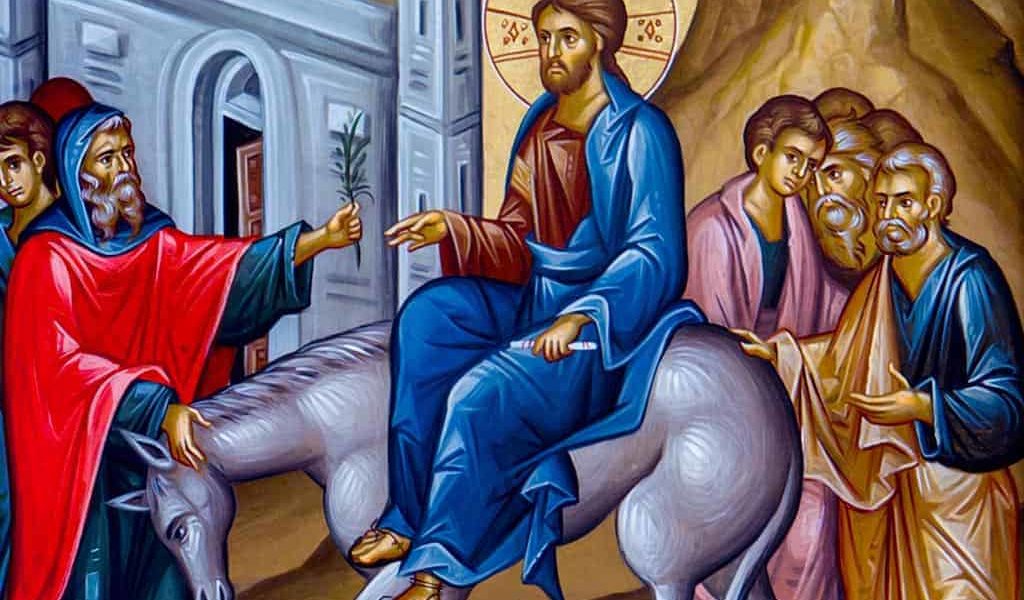
The Feast of the Entrance of our Lord Jesus Christ into Jerusalem
On the Sunday before the Feast of Great and Holy Pascha and at the beginning of Holy Week, the Orthodox Church celebrates one of its most joyous feasts of the year. Palm Sunday is the commemoration of the Entrance of our Lord into Jerusalem following His glorious miracle of raising Lazarus from the dead. Having anticipated His arrival and having heard of the miracle, the people when out to meet the Lord and welcomed Him with displays of honour and shouts of praise. On this day, Christians receive and worship Christ in this same manner, acknowledging Him as our King and Lord.
Biblical Story
The biblical story of Palm Sunday is recorded in all four of the Gospels (Matthew 21:1-11; Mark 11:1-10; Luke 19:28-38; and John 12:12-18). Five days before the Passover, Jesus came from Bethany to Jerusalem. Having sent two of His disciples to bring Him a colt of a donkey, Jesus sat upon it and entered the city.
People had gathered in Jerusalem for the Passover and were looking for Jesus, both because of His great works and teaching and because they had heard of the miracle of the resurrection of Lazarus. When they heard that Christ was entering the city, they went out to meet Him with palm branches, laying their garments on the ground before Him, and shouting, “Hosanna! Blessed is he that comes in the Name of the Lord, the King of Israel!”
At the outset of His public ministry Jesus proclaimed the kingdom of God and announced that the powers of the age to come were already active in the present age (Luke 7:18-22). His words and mighty works were performed “to produce repentance as the response to His call, a call to an inward change of mind and heart which would result in concrete changes in one’s life, a call to follow Him and accept His messianic destiny. The triumphant entry of Jesus into Jerusalem is a messianic event, through which His divine authority was declared.
Palm Sunday summons us to behold our king: the Word of God made flesh. We are called to behold Him not simply as the One who came to us once riding on a colt, but as the One who is always present in His Church, coming ceaselessly to us in power and glory at every Eucharist, in every prayer and sacrament, and in every act of love, kindness and mercy. He comes to free us from all our fears and insecurities, “to take solemn possession of our soul, and to be enthroned in our heart,” as someone has said. He comes not only to deliver us from our deaths by His death and Resurrection, but also to make us capable of attaining the most perfect fellowship or union with Him. He is the King, who liberates us from the darkness of sin and the bondage of death. Palm Sunday summons us to behold our King: the vanquisher of death and the giver of life.
Palm Sunday summons us to accept both the rule and the kingdom of God as the goal and content of our Christian life. We draw our identity from Christ and His kingdom. The kingdom is Christ – His indescribable power, boundless mercy and incomprehensible abundance given freely to man.
On this Sunday, in addition to the Divine Liturgy, the Church observes the Blessing and Distribution of the Palms. A basket containing the woven palm crosses is placed on a table in front of the icon of the Lord, which is on the Iconostasion. The prayer for the blessing of the Palms is found in the Ieratikon or the Euxologion. According to the rubrics of the Typikon, this prayer is read at the Orthros just before the Psalms of Praise (Ainoi). The palms are then distributed to the faithful. In many places today, the prayer is said at the conclusion of the Divine Liturgy, before the apolysis. The text of the prayer, however, indicates clearly that it is less a prayer for the blessing of the palms, even though that is its title, and more a blessing upon those, who in imitation of the New Testament event hold palms in their hands as symbols of Christ’s victory and as signs of a virtuous Christian life. It appears then, that it would be more correct to have the faithful hold the palms in their hands during the course of the Divine Liturgy when the Church celebrates both the presence and the coming of the Lord in the mystery of the Eucharist.
*Source: GOARCH


